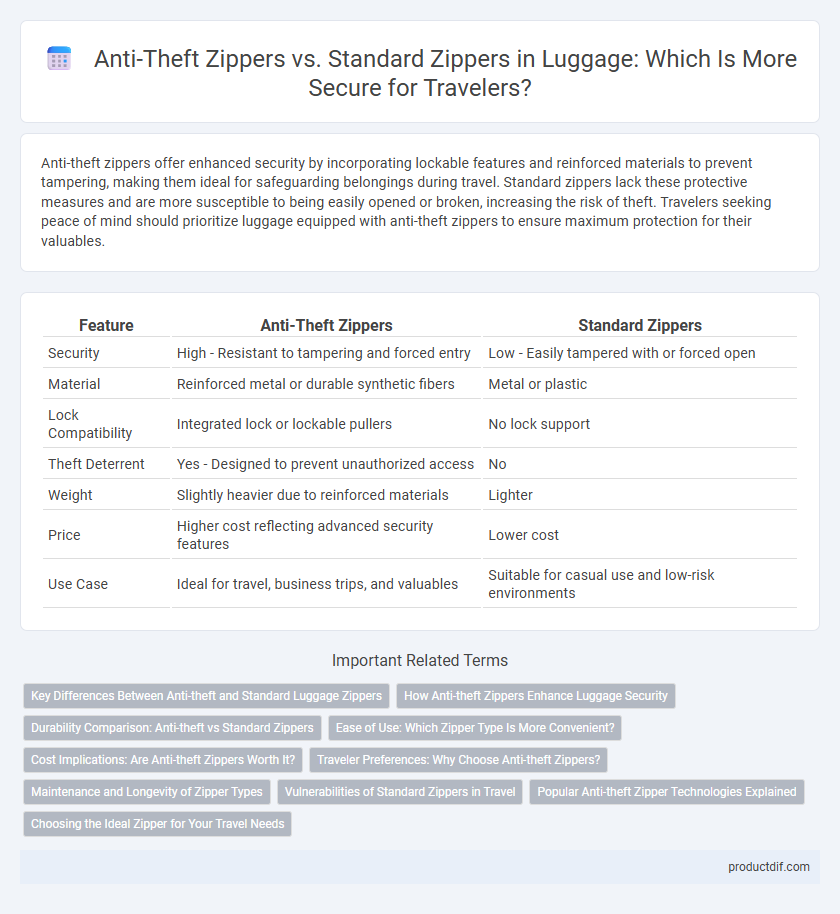Anti-theft zippers offer enhanced security by incorporating lockable features and reinforced materials to prevent tampering, making them ideal for safeguarding belongings during travel. Standard zippers lack these protective measures and are more susceptible to being easily opened or broken, increasing the risk of theft. Travelers seeking peace of mind should prioritize luggage equipped with anti-theft zippers to ensure maximum protection for their valuables.
Table of Comparison
| Feature | Anti-Theft Zippers | Standard Zippers |
|---|---|---|
| Security | High - Resistant to tampering and forced entry | Low - Easily tampered with or forced open |
| Material | Reinforced metal or durable synthetic fibers | Metal or plastic |
| Lock Compatibility | Integrated lock or lockable pullers | No lock support |
| Theft Deterrent | Yes - Designed to prevent unauthorized access | No |
| Weight | Slightly heavier due to reinforced materials | Lighter |
| Price | Higher cost reflecting advanced security features | Lower cost |
| Use Case | Ideal for travel, business trips, and valuables | Suitable for casual use and low-risk environments |
Key Differences Between Anti-theft and Standard Luggage Zippers
Anti-theft zippers feature tamper-proof designs with locking mechanisms and reinforced materials to prevent unauthorized access, while standard zippers lack these security enhancements, making them more vulnerable to theft. Anti-theft zippers commonly use metal teeth or coated materials that resist cutting, whereas standard zippers often employ plastic teeth that are easier to break. The key difference lies in security; anti-theft zippers offer robust protection for valuables during travel, ensuring peace of mind.
How Anti-theft Zippers Enhance Luggage Security
Anti-theft zippers feature hidden or lockable designs that prevent unauthorized access, significantly enhancing luggage security compared to standard zippers. These zippers often incorporate puncture-resistant materials and tamper-evident mechanisms, deterring theft and tampering during travel. Their robust construction minimizes the risk of zipper breakage or forced entry, providing travelers with increased peace of mind.
Durability Comparison: Anti-theft vs Standard Zippers
Anti-theft zippers are engineered with reinforced materials and locking mechanisms that enhance durability and resist tampering, making them more robust than standard zippers. Standard zippers typically use basic metal or plastic teeth that may wear out or break under frequent use or force. For long-term reliability, anti-theft zippers provide superior strength and security, ideal for protecting valuables in luggage during travel.
Ease of Use: Which Zipper Type Is More Convenient?
Anti-theft zippers often feature locking mechanisms and reinforced materials, which provide enhanced security but can make them slightly more challenging to operate compared to standard zippers. Standard zippers offer smoother and quicker access, making them more convenient for frequent use and quick packing or unpacking. Travelers prioritizing ease of use typically prefer standard zippers, while those valuing security may accept the minor trade-off in convenience with anti-theft zippers.
Cost Implications: Are Anti-theft Zippers Worth It?
Anti-theft zippers typically cost 20-30% more than standard zippers due to reinforced materials and lockable designs, which enhance security against theft. Investing in luggage with anti-theft zippers can reduce potential losses from stolen valuables, potentially offsetting the higher upfront cost through added protection. For travelers frequently in high-risk areas or carrying valuable items, the cost premium often justifies the peace of mind provided by enhanced zipper security features.
Traveler Preferences: Why Choose Anti-theft Zippers?
Travelers prioritize anti-theft zippers due to their reinforced locking mechanisms and cut-resistant materials, which significantly reduce the risk of unauthorized access. These zippers often feature integrated locking systems compatible with TSA-approved locks, providing enhanced security during transit. Standard zippers lack these protective features, making them more vulnerable to tampering and theft in crowded travel environments.
Maintenance and Longevity of Zipper Types
Anti-theft zippers feature reinforced designs such as interlocking teeth and lockable sliders that enhance durability and reduce wear from frequent handling, extending the lifespan of the luggage. Standard zippers, while simpler and easier to repair, tend to suffer more stress and damage over time due to less robust construction. Proper maintenance, including cleaning and lubricating the zipper teeth, significantly increases the longevity of both types, but anti-theft zippers generally require less frequent repairs and replacements.
Vulnerabilities of Standard Zippers in Travel
Standard zippers in luggage often pose significant security vulnerabilities due to their susceptibility to being easily forced open or tampered with using simple tools. Unlike anti-theft zippers, which are designed with reinforced materials and locking mechanisms, standard zippers lack built-in protection against prying and are more prone to accidental opening during travel. This makes standard zippers a common target for theft, compromising the safety of valuable belongings inside the luggage.
Popular Anti-theft Zipper Technologies Explained
Popular anti-theft zipper technologies include lockable sliders and tamper-resistant designs that enhance luggage security by preventing unauthorized access. RFID-blocking zipper pulls and slash-proof materials further protect valuables from electronic theft and physical attacks. Compared to standard zippers, these advanced features significantly reduce the risk of theft during travel.
Choosing the Ideal Zipper for Your Travel Needs
Anti-theft zippers offer enhanced security with lockable sliders and reinforced materials, making them ideal for travelers concerned about theft during transit. Standard zippers provide convenience and quick access but may be more vulnerable to tampering or forced entry. Selecting the right zipper depends on balancing security priorities with ease of use based on the specific travel environment and luggage type.
Anti-theft zippers vs Standard zippers Infographic

 productdif.com
productdif.com